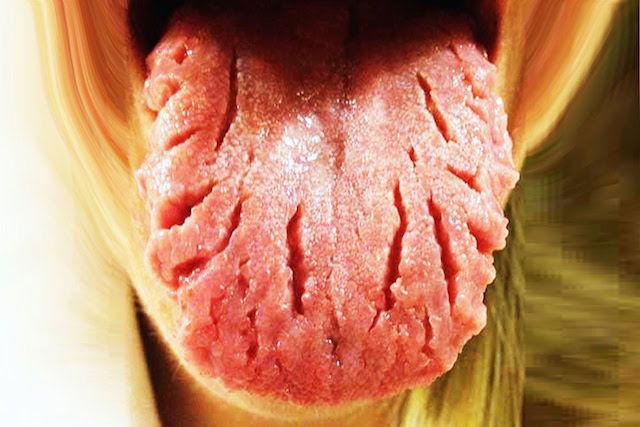The fissured tongue, also called the cracked language, is a change in which there are cracks in the language, which can make it difficult to hygiene and lead to the accumulation of food remains, causing symptoms such as bad breath and burning in the tongue.
Although it does not have a specific cause, the tongue is usually present from birth and is more common in people with Down syndrome, psoriasis or Sjögren syndrome, for example.
Treatment of the fissured tongue should be guided by the dentist and consists of proper hygiene of the mouth, which should include the use of floss, tongue scraper and appropriate brush, and is recommended to have a diet without acid and/ or spicy foods to prevent local irritation.
Sensitive content
This image may have uncomfortable content for some people.

Main symptoms
The main symptoms of the fissured language are:
- Cracks in the tongue;
- Accumulation of food remains in the cracks;
- Pain or burning in the tongue;
- Bad breath;
- Change of language color.
However, the symptoms are more common when cracks are deeper, making it difficult to clean the tongue, favoring the multiplication of microorganisms and causing inflammation.
Possible causes
The fissured language does not have a specific cause, and is usually a present change from birth and can be more easily noticed as the person ages.
In addition, the fissured tongue is more common in people with Down syndrome, psoriasis, Sjögren syndrome, Melkerson-Rosenthal syndrome and acromegaly, for example.
B vitamin deficiencies of B, Zinc and Iron Complex can also contribute to changes in the mucosa of the mouth, leading to the appearance of cracks in the tongue.
In some cases, people who have the geographical language, which is when the taste buds are more evident, forming a kind of ‘map’ in the tongue, they can also have the tongue fissured. Understand better what the geographical language is.
How treatment is done
Treatment of the fissured language usually involves:
1. Hygiene of the mouth
To perform a proper mouth hygiene, it is recommended to use floss and brush your teeth after meals to avoid the accumulation of food in the mouth. It may be recommended by the dentist to use specific brushes. See how to brush your teeth correctly.
In addition, the dentist can guide the use of oral rinsing to help eliminate bacteria or fungi that may be excessive in the mouth and cleaning the tongue with a scraper to remove all the rest of food from cracks. Understand how to use the tongue scraper.
2. Healthy eating
It is recommended to avoid acidic foods such as orange, lemon and vinegar, and spicy foods such as pepper -based sauces and spices such as curry and cayenne pepper to prevent irritation and fissure burning.
In addition, a diet rich in B vitamins of B, Zinc and Iron, such as lean meats, eggs, beans, seeds and nuts, can help repair the fissured tongue.
3. Use of probiotics
Probiotics are bacteria that bring health benefits, such as in the balance of the bacterial flora of the mouth, and may assist in the treatment of the fissured language.
Probiotics can be found naturally in some foods, such as yogurt or kefir. See other probiotic foods.
4. Medical follow -up
Follow-up by the general practitioner or rheumatologist in cases of conditions such as Down Syndrome, Psoriasis, Sjögren Syndrome, Melkerson-Rosenthal Syndrome is recommended to prevent the fissured language.
In such cases, control of the main cause of the fissured language should be included, and may be indicated by the doctor the use of immunosuppressors such as hydroxychloroquine or corticosteroids such as prednisone.
Source: www.tuasaude.com